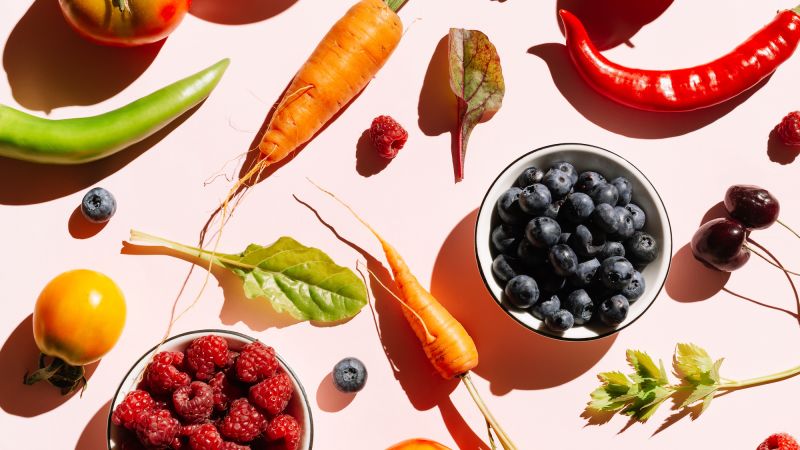Subscribe to CNN’s “Eat, But Better: Mediterranean Style.” Our 8-part guide shares delicious, expert-recommended eating habits that will boost your health for a lifetime..
CNN
—
A new study suggests that eating a few more apples (and some broccoli florets, cucumbers, bananas and kidney beans) could keep your doctor away, especially for people with high blood pressure, who are at risk of heart and kidney disease.
“The two biggest problems that people with high blood pressure suffer from are heart disease and kidney disease,” said Dr. Donald Wesson, professor of internal medicine at Dell Medical School at the University of Texas at Austin and the study’s lead researcher.
“This study examined whether reducing the amount of acid in the diet could reduce kidney and heart disease-related complications associated with high blood pressure,” he said.
Wesson said animal foods, especially meat, tend to produce acids, while fruits and vegetables produce bases when consumed.
To explore how the plant might help, researchers conducted a randomized controlled trial in 153 people who were at high risk of developing high blood pressure and chronic kidney disease.
Participants were split into three groups: one added two to four cups of fruits and vegetables to their diet, one added baking soda (four to five 650-milligram tablets) twice a day, and one continued with standard medical care. Baking soda reduces acid, according to the study.
After the five-year study, Wesson said, the researchers found that while a plant-rich diet and baking soda promoted kidney health, only fruits and vegetables also improved heart health.
“Our conclusion was that a diet high in fruits and vegetables should be the basis for managing patients with high blood pressure and hypertension,” he said.
“This study is just the latest in a growing body of literature on the health benefits of plant-rich diets,” said Dr. Marion Nestle, professor emeritus of nutrition, food and public health at New York University, who was not involved in the study.
“This has been known for a long time, but the added benefit of reduced kidney disease is good,” she said.
Basic and acidic
Why should we avoid acid? The focus of research in Dr. Wesson’s laboratory is on how the kidneys remove acids from the blood and excrete them through urine.
A few years ago, he said, his research team showed that acid-producing diets were harmful to animals’ kidneys, while base-producing diets were healthy for them, and that subsequent studies found similar results in humans.
The problem, Wesson says, is that most Americans eat far more acid-forming meat and animal products than basic fruits and vegetables.
“The real question going forward is not whether fruits and vegetables will help people with high blood pressure,” he said. “The question is, how can most people with high blood pressure get started on such a diet and stick with it?”
How to get all the fruits and vegetables
Even if you don’t have high blood pressure, the more fruits and vegetables you eat, the better, Wesson says.
of American Heart Association Four to five servings of fruits and vegetables per day are recommended, with one serving being the equivalent of five to eight pieces of broccoli, one banana, one cup of raw leafy greens, or four large strawberries.
Particularly helpful for heart health is the Dietary Approaches to Stop Hypertension (DASH) diet.
The DASH eating plan includes 4-6 servings of vegetables, 4-6 servings of fruit, 3 servings of whole grain products, 2-4 servings of fat-free or low-fat dairy products, lean meats, nuts, seeds, and legumes, each consumed several times per day.
Nutritional changes can be extremely beneficial for health, but they are rarely prioritized, Wesson said.
“Historically, it has been very difficult for patients to adhere to such a diet because fruits and vegetables are not readily available or attractive in our society,” he said.
To combat the limited appeal, cardiologist Dr. Andrew Freeman, who was not involved in the study, suggests experimenting with eating.
In-season fruits are incredibly sweet and delicious, and adding seasonings and sauces, especially those that connect with your roots, can be a fun way to infuse your veggies with flavors you love, says Freeman, director of cardiovascular prevention and wellness at National Jewish Health in Denver.
“There’s a growing movement in the culinary world where chefs and cooks are focusing on making vegetables ‘unapologetically delicious’ ( An edgy veggie toolkit “Dr. Christopher Gardner, a professor of medicine at the Stanford Prevention Research Center, said: In California, “We’re not aware of any studies that have shown that the effects of consuming foods that are high in fiber are not yet known,” Gardner, who heads the center’s nutrition research group and was not involved in the study, said in an email.
“There are lots of simple ways to prepare vegetables that can make them more delicious than just eating them raw or steamed,” he said.
But sometimes communities don’t have access to fresh produce, Wesson added.
Wesson said medication remains an important part of managing blood pressure, kidney disease and heart disease, and this study shows that health systems should focus on incorporating nutrition into the management of these diseases.
“Plant-based diets – mostly, but not necessarily exclusively, plant-based – are clearly associated with improved overall health, less chronic disease (including kidney disease) and lower premature mortality,” Nestle said.
